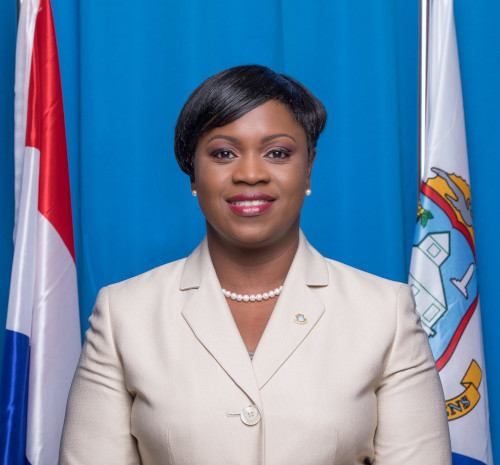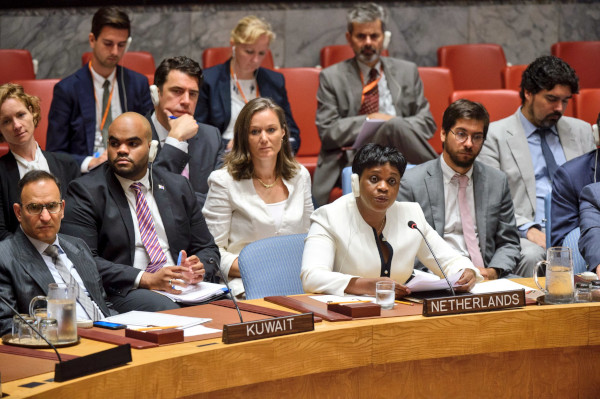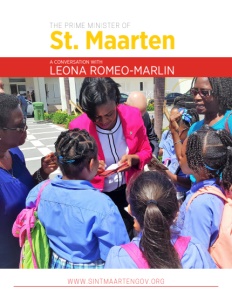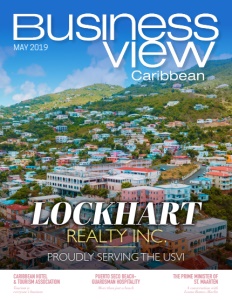The Prime Minister of St. Maarten
A conversation with Leona Romeo-Marlin
Business View Caribbean interviews the Prime Minister of St. Maarten, Leona Romeo-Marlin, for our focus on the Strength and Resiliency of St. Maarten.
As Prime Minister of St. Maarten, Leona Romeo-Marlin has taken on a role that is both daunting and rewarding. Offering strength, vision, and hope to a population still reeling from the onslaught of Hurricanes Irma and Maria, and focusing government efforts on post-hurricane restoration, while recognizing the inevitable need for changes and sustainable economic decision-making.

Prime Minister of St. Maarten, Leona Romeo-Marlin
After taking office in January 2018, Prime Minister Romeo-Marlin outlined five strategic objectives: Setting It Right; Revive and Restore; Restructuring Government; Safety and Security; and Health and Social Wellbeing. In a recent conversation with Business View Caribbean, the Prime Minister discussed these important objectives. The following is an edited transcript of her remarks.
BVC: Could you describe, in detail, your government’s five strategic goals?
PM: “Those five points are in our ‘Building a Sustainable St. Maarten’ program and we have incorporated all aspects of that into the direction we want to go as a government.
Setting It Right
“Since we’ve been in office, our focus has been to set things right, as it relates to homes and schools that were destroyed, the public service we give, infrastructure that was damaged, residents that have lost their jobs. It’s included in our National Recovery and Resilience Plan because it is part of our governing program. Having long-term management plans is key for us and we’ve been working diligently on that.
“It’s basically putting St. Maarten back on track. Cleaning up the landfill, our coastal waters… we’ve had several island-wide cleanups and we’ll continue to do such because we still have to deal with the debris on the island. We are looking at establishing a waste and sewage management division under our electricity company, because no one in St. Maarten pays for garbage disposal, so we have to see how we can make that sustainable, as well. And we’re looking at investing in our financial reconstruction and restoring of our infrastructure.”
Revive and Restore
“Revive and Restore is about rebuilding with the emphasis of being more sustainable. We’re looking at creating more homes because we have a serious shortage. Our airport was severely destroyed and we’re still building it back up to full operation. We want to make sure we have U.S. pre-clearance here on St. Maarten, because that will give us a competitive edge over the other islands. We’re working on establishing an economic master plan that introduces incentive programs for small businesses; stimulating entrepreneurships and job creation. We have started a program to train persons who lost their jobs in the hotel industry, for example, and others who are learning trades needed for the rebuilding process. We’re also looking at diversifying our economy and promoting our tourism industry.”
Restructuring Government
“This is about improving the efficiency of government and giving the general public better service. For example: e-governance, modernizing the way we work, synchronizing our data bases, linking different offices – the whole IT and technology aspect of it that would improve our service; looking at strengthening the government apparatus through staff training and creating programs that fill in deficiencies. Whether we’re sending our workers abroad, or bringing people in to help train them, or getting a counterpart policy where someone with a specific expertise would be able to train our workers. We’re even looking at strengthening our judicial department, where we have a lack of persons to write law. Right now, we’re exploring the possibility of having virtual classes offering the opportunity to specialize in writing legislation and several other areas across the board. We need an assessment of the entire government apparatus to make sure it can run efficiently for the services we give to the public.
“Bringing changes to the electoral system and certain laws is also included under restructuring. I just started a committee to do an assessment on electoral reform; we will make a proposal and bring it to parliament, so we can compare notes with their committee because we think some things in the constitution might have to change, but we definitely know that some laws will have to be amended. When I think about restructuring government, I look at our tax office and it’s all tied into e-governance and making sure our people are tax compliant. By improving our compliancy, we would have a sounder financial management system, so as money comes in, it could go back out right away. That’s a problem this government decided to tackle as part of restructuring.”
Safety and Security
“In terms of Safety and Security, as an island that is divided into both French side and Dutch side, I think about, for example, ensuring that our prison is modernized and we have proper rehabilitation for those who are incarcerated. We look at persons who would like to become Dutch citizens, ensuring there is a path for them to obtain the Dutch nationality. We’re looking at upgrading and strengthening the police force; the volunteer corps; all entities that wear a uniform; introducing more community policing and ensuring our men and women in blue have the right equipment and advanced training to execute their jobs more efficiently. We’re looking at ensuring that there is proper and improved street lighting, better road signs, that the sidewalks are safe for pedestrians, and damages are repaired. That’s all part of upgrading our public protection and national security.”
Health and Social Wellbeing
“This point in our governing program is about promoting health and wellbeing in the lives of the citizens of St. Maarten. We started with the hospital project, rebuilding our medical center and ensuring we receive funding from the $2 million trust fund given by the Netherlands to build the hospital to withstand more than 180 mph sustained winds. Right now, we don’t know what our poverty line is on St. Maarten, so we need to find that out and do a good assessment on our social welfare benefits because that is not properly balanced. We have to look at how to accelerate education in more innovative ways in the health and wellbeing sector. And lastly, improving our youth development and upgrading our sports facilities and programs. We have a lot of talent here in St. Maarten, but the hurricanes devastated our facilities; it’s just recently that we put our lights back up. We want to make sure our youth athletes have a good program to excel in the area of sports.”

PM Leona Romeo-Marlin addressing the UN
BVC: How will you make healthcare more accessible for St. Maarten residents?
PM: “We have been working on a huge general health insurance project with the assistance of PAHO (Pan-American Health Organization). The law to establish General Health Insurance is actually finalized and is going to parliament for vetting. The main thing we were looking for is to ensure that everyone has the basic ‘universal’ healthcare package coverage, and that the cost of prescription drugs is lowered. There’s been a lot of debate about whether we could afford it. PAHO has helped us see what is available, regionally, in the Caribbean, what we can learn from the best practices of the other islands, and how we can implement it here. It should be approved shortly and our Minister of Health is eager to introduce it to our community.”
BVC: How is your administration addressing climate change?
PM: “It is estimated that we will get more hurricanes. As a country, the key to preparation for disaster is preparation, itself. You prepare your people by ensuring that they take responsibility because it’s a shared responsibility. As a government, we are bringing information to the public. Internally, we are looking at our Emergency Operations Center (EOC) – I am Chair of that, and each of our Ministries has an emergency support function, as does Electricity, and Telecommunications.
“When I became Prime Minister, the first thing we did was identify our challenges after Irma and Maria and come up with a plan of action that included taking preventative measures. Having conferences to inform the public: one with our emergency group and key businesspeople that we expanded to an expo to inform the people of St. Maarten how to prepare for a hurricane and build back better. We invited insurance companies, NGOs, Red Cross, Animal Welfare organizations, hardware stores… we gave information to schools about evacuation. We’re telling them in advance how to be prepared. Making sure you have enough cash on hand is also key because, after a storm, the bank or ATM may not be accessible, and there’s a curfew. Also, remember to stock up on necessary medications.
“How do you prepare a nation for a hurricane? You plan in advance, you communicate, use different means of media – and this has been well received by our community. Those two hurricanes have raised the bar in preparedness. We have regional and international partnerships with the U.S., the Netherlands, CDEMA (Caribbean Disaster Emergency Management Agency), and UNDAC (UN Disaster Assessment & Coordination) for search and rescue and mapping. We have built closer ties with our kingdom partners (Aruba and Curacao) who helped us tremendously with evacuation and military security support.
“We now have Caribbean Catastrophe Risk Insurance that gives quick access to money, so we don’t have to use the national budget for repairs – we’ve never had that for a disaster before. We also created a Disaster Management fund, and we’ll continue to prepare our country for any major disaster that comes our way.”
BVC: What are the most important goals for your administration?
PM: “Resiliency. Our goal is ensuring we build back St. Maarten more resilient and better and sustainable. Administratively, we have challenges with that, but we are putting them in order. It’s a process. We are in recovery but it’s not a sprint, it’s a marathon, and we need patience to ensure we are improving the areas we were weak in, before, and to make sure we are well protected in the future. Our building codes, our infrastructure, that is what our administration is dealing with. Even though St. Maarten didn’t have money, we as a people were very resilient after the storms. Together, we started cleaning and building back and we continue to do so.”
AT A GLANCE
Who: Leona Romeo-Marlin
What: Office of the Prime Minister of St. Maarten
Where: Philipsburg, St. Maarten
Website: www.sintmaartengov.org




 This information will never be shared to third parties
This information will never be shared to third parties